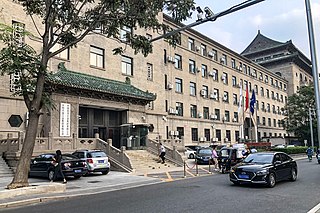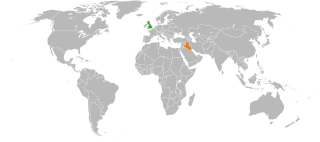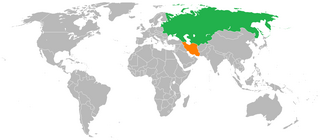Related Research Articles

In law enforcement, a sting operation is a deceptive operation designed to catch a person attempting to commit a crime. A typical sting will have an undercover law enforcement officer, detective, or co-operative member of the public play a role as criminal partner or potential victim and go along with a suspect's actions to gather evidence of the suspect's wrongdoing. Mass media journalists occasionally resort to sting operations to record video and broadcast to expose criminal activity.
International Traffic in Arms Regulations (ITAR) is a set of U.S. Department of State regulations that control the export of defense and military technologies to safeguard national security and further its foreign policy objectives.

In politics, diplomacy and export control, dual-use items refer to goods, software and technology that can be used for both civilian and military applications.

China North Industries Group Corporation Limited, doing business internationally as Norinco Group, and known within China as China Ordnance Industries Group Corporation Limited, is a Chinese state-owned defense corporation that manufactures commercial and military products. Norinco Group is one of the world's largest defense contractors.
Lekem, an acronym for ha-Lishka le-Kishrei Mada, was an Israeli intelligence agency headed by Benjamin Blumberg (1957–1981), and Rafi Eitan (1981–1986). It collected scientific and technical intelligence abroad from both open and covert sources, particularly for Israel's nuclear program. It was disbanded in 1986 following the arrest of Jonathan Pollard for espionage on behalf of Israel. Pollard was a United States Navy intelligence employee in the Naval Antiterrorist Alert Center in Washington, D.C. He was paid for delivering large amounts of classified documents to Lekem agents. Pollard was convicted and sentenced to life imprisonment.
Armimex was a state–owned Bulgarian company with a full license for export, import and re–export of all types of weapons, ammunition and special products for the army and the police.
Iran's military industry manufactures and exports various types of arms and military equipment. Iran's military industry, under the command of Iran's Ministry of Defence and Armed Forces Logistics, is composed of the following main components:

United States support for Ba'athist Iraq during the Iran–Iraq War, in which it fought against post-revolutionary Iran, included several billion dollars' worth of economic aid, the sale of dual-use technology, military intelligence, and special operations training. The U.S. refused to sell arms to Iraq directly due to Iraq's ties to Palestinian groups which the U.S. designates as terrorist organizations such as the Palestinian Liberation Front and Abu Nidal Organization, but several sales of "dual-use" technology have been documented; notably, Iraq purchased 45 Bell helicopters for $200 million in 1985. Of particular interest for contemporary Iran–United States relations are accusations that the U.S. government actively encouraged Iraqi leader Saddam Hussein to invade Iran, supported by a considerable amount of evidence and generally regarded as the conventional wisdom in the Arab world, but several scholars and former U.S. government officials deny that any such collusion occurred, and no direct documentary proof of it has been found.
Monzer al-Kassar, also known as the "Prince of Marbella", is a Syrian arms dealer. He has been connected to numerous crimes, including the Achille Lauro hijacking and the Iran-Contra scandal. On 20 November 2008, he was convicted in U.S. federal court as part of a U.S. government sting, for agreeing to sell arms to undercover agents posing as suppliers for the Revolutionary Armed Forces of Colombia (FARC), a Colombian guerrilla organization. He was sentenced to thirty years' imprisonment.
The support by France was an important element to strengthen Iraq for the Iran–Iraq War. Starting in roughly 1975, leading up to the Iran–Iraq War, as well as the war itself, the greatest amount of military equipment came to Iraq from the Soviet Union, but France was probably second, and generally provided higher-technology equipment than the Soviets.

The United Kingdom supported Ba'athist Iraq as early as 1981 during the Iran–Iraq War by covertly providing military equipment and arms. Although officially neutral in the conflict, the United Kingdom made direct sales to both Iraq and Iran. With an embargo in effect various companies also supplied Iraq and Iran by shipping materials through third-party countries and from those countries to the belligerents. While some of this exporting was legal, permitted or tolerated by parliament, Iraqi clandestine procurement operations were especially active in Britain.

The policy of the Soviet Union towards the Iran–Iraq War from 1980 to 1988 varied, beginning with a stance of "strict neutrality" and moving towards massive military support for Iraq in the final phase of the war. The war was inconvenient for the USSR, which had aimed to ally itself with both Iran and Iraq. In the first period of the war, the Soviets declared a policy of "strict neutrality" towards the two countries, at the same time urging a negotiated peace. Iraq had been an ally for decades and the Soviets had tried to win over Iran as well, but their offers of friendship were rebuffed by both the pro-Western Shah and the Ayatollah of Iran. After the Iranian revolution, the Islamic Republic established its slogan as "neither East nor West." In 1982, the war turned in Iran's favor and the Iranian leader Ayatollah Khomeini pledged not to stop the conflict until he had overthrown the Iraqi president Saddam Hussein. Such a prospect was unacceptable to the Soviet Union, which now resumed arms sales to Iraq while still maintaining an official policy of neutrality. The Soviets also feared losing Saddam's friendship with the West. After further Iranian gains in 1986, the Soviet Union massively increased its military aid to Iraq. The Soviets were now afraid of the Iranians encouraging Islamic revolution in Central Asia. Soviet aid allowed the Iraqis to mount a counteroffensive which brought the war to an end in August 1988.

Gunwalking, or "letting guns walk", was a tactic used by the Arizona U.S. Attorney's Office and the Arizona Field Office of the United States Bureau of Alcohol, Tobacco, Firearms and Explosives (ATF), which ran a series of sting operations between 2006 and 2011 in the Tucson and Phoenix area where the ATF "purposely allowed licensed firearms dealers to sell weapons to illegal straw buyers, hoping to track the guns to Mexican drug cartel leaders and arrest them" - however as of October 2011, none of the targeted high-level cartel figures had been arrested. These operations were done under the umbrella of Project Gunrunner, a project intended to stem the flow of firearms into Mexico by interdicting straw purchasers and gun traffickers within the United States. The Jacob Chambers Case began in October 2009 and eventually became known in February 2010 as Operation Fast and Furious after agents discovered Chambers and the other suspects under investigation belonged to a car club.
Tomislav Damnjanovic is a Serbian businessman and arms smuggler. A former employee of Yugoslavia's national airline, Damnjanovic founded his own company transporting supplies aboard an Ilyushin Il-76 freight carrier. With increasing United Nations sanctions on Yugoslavian airlines, he began to expand his operations into illegal smuggling. He attained notoriety in 2002 when he was contracted to deliver "millions of rounds of ammunition, guns, grenades and mortars" to aid the US military during the ongoing War In Iraq and War in Afghanistan. At the time, United Nations officials investigating his previous activities discovered a 15 year history of weapons deals with Libyan, Liberian, Republic of the Congo officials as well as Al Qaeda-linked Islamist groups in Somalia and other smuggling deals backed Yugoslav president Slobodan Milosevic. The United Nations claimed that in 2006, 45 tons of supplies were sold to the Islamic Courts Union at the same time as Damnjanovic was contracted to supply US forces.
The defense industry of Israel is a strategically important sector and a large employer, as well as a major supplier of the Israel Defense Forces. The country is a large exporter of military equipment, accounting for 2.1% of the world total in 2024. Three Israeli companies were listed on the 2022 Stockholm International Peace Research Institute index of the world's top 100 arms-producing and military service companies: Elbit Systems, Israel Aerospace Industries and RAFAEL. It is also a major player in the global arms market with a 2.3% share of the global exports of major arms as of 2023. Total arms transfer agreements topped $12.9 billion between 2004 and 2011. There are over 150 active defense companies based in the country with combined revenues of more than $3.5 billion annually. Israeli defense equipment exports reached $7 billion in 2012, making it a 20 percent increase from the amount of defense-related exports in 2011. With the Russian invasion of Ukraine, arms exports reached $12.5 billion in 2022. Much of the exports are sold to the United States and Europe. Other major regions that purchase Israeli defense equipment include Southeast Asia and Latin America. India is also major country for Israeli arms exports and has remained Israel's largest arms market in the world.
Cyrus Hashemi was an Iranian arms dealer linked to the Iran-Contra affair, Brokers of Death arms case, and 1980 October Surprise theory. Robert Dreyfuss claimed Hashemi was a CIA and Mossad agent; Hashemi sued Dreyfuss and Lyndon LaRouche, whose Executive Intelligence Review had accused Hashemi of being linked to the alleged "funding of Iranian terrorism in the United States," with the case dismissed in June 1983 due to Hashemi's failure to respond to legal documents. Hashemi died from acute myeloblastic leukemia July 1986 in London.
The 'Brokers of Death' arms case was a US criminal case in the 1980s relating to the attempted shipment of $2.5bn worth of US-made arms to Iran. The Los Angeles Times in 1986 described the case as "the largest arms conspiracy prosecution ever brought by the Justice Department". The case was dropped in January 1989 after the prosecution said it could not prove the defendants did not believe their dealings were officially sanctioned. The planned deals were being arranged at the same time as the White House was secretly seeking to arrange arms sales to Iran, in what became known as the Iran-Contra affair; some evidence indicated that defendants were aware of these efforts.
Joseph F. King is a former senior US Customs agent and criminal justice academic. He served for 33 years as a Special Agent in the United States Customs Service's New York office. He is an associate professor at the John Jay College of Criminal Justice.

The defence industrial sector of India is strategically important in India. India has one of the world's largest military forces with a strength of over 1.44 million active personnel. The country has the world's largest volunteer military of over 5.1 million personnel. The total budget sanctioned for the Indian military for the financial year 2021 is ₹4.78 lakh crore. It has the third largest annual defence budget behind USA and China. It is the second largest defence importer behind Saudi Arabia making up 9.2% of global arms imports. India has a domestic defence industry of which 60% is government owned. The public sector includes NTRO, CSIR, PRL, DRDO and its 50 labs, 4 defence shipyards, 12 defence public sector undertakings (PSUs). India has a new defence procurement, acquisition and manufacturing policy to reduce imports and enhance domestic manufacturing.
David Locke Hall is a highly decorated former Assistant United States Attorney, Naval Intelligence officer, and author.
References
- ↑ Shiffman, John, Operation Shakespeare: The True Story of an Elite International Sting, Simon and Schuster. http://www.simonandschuster.com/books/Operation-Shakespeare/John-Shiffman/9781451655162
- 1 2 "Arms dealer key to deal on U.S. hikers?". msnbc.com. 17 May 2010. Archived from the original on 12 October 2013. Retrieved 10 May 2018.
- ↑ "Iranian convicted in arms smuggling case deported". Fox News. 20 March 2012. Retrieved 10 May 2018.
- 1 2 "US Export enforcement document". Department of Justice. May 2015. Retrieved 3 May 2023.
- ↑ "Busted Iranian Arms Agent Tells of War Prep". ABC News. 2 December 2009.
- 1 2 Shiffman, John (14 March 2012). "U.S. deports Iranian arms broker arrested in 2007 sting". Reuters.com. Retrieved 10 May 2018.
- ↑ Avag, Robert. "Case Study - Inventive U.S. Sting Operation Catches Iran-Based Military Equipment Smuggler | Institute for Science and International Security". isis-online.org. Retrieved 10 May 2018.